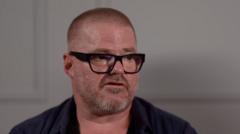Celebrity Chef Heston Blumenthal Embraces Bipolar Diagnosis with Positive Outlook
Renowned celebrity chef Heston Blumenthal has openly shared his recent bipolar disorder diagnosis, offering a refreshingly optimistic perspective on mental health. The acclaimed culinary expert, known for his innovative approach to cooking, describes his diagnosis as “not all doom and gloom” and views it as an integral part of his identity.
This is not Blumenthal’s first experience with neurodivergent diagnoses. In 2017, he was previously assessed and diagnosed with Attention Deficit Hyperactivity Disorder (ADHD), which preceded his more recent bipolar disorder diagnosis earlier this year.
Bipolar disorder is a complex and severe mental health condition characterized by significant mood fluctuations. Individuals with this condition experience dramatic shifts between emotional extremes, typically alternating between periods of elevated, energetic moods (mania) and periods of deep depression.
Despite the challenges associated with bipolar disorder, Blumenthal’s candid and positive approach demonstrates a progressive attitude towards mental health awareness. By speaking openly about his diagnosis, he helps reduce stigma and encourages others to seek understanding and support.
Professionally, Blumenthal remains a powerhouse in the culinary world. He owns and operates several critically acclaimed restaurants, including the three-Michelin-starred Fat Duck, which is internationally recognized for its groundbreaking approach to gastronomy. His two-Michelin-starred restaurant, Dinner by Heston Blumenthal, and the Michelin-starred Hind’s Head and Perfectionists’ Cafe further cement his reputation as an exceptional chef and restaurateur.
Blumenthal’s willingness to discuss his mental health publicly represents a significant step in normalizing conversations about neurodivergence and mental health conditions. By sharing his personal experience, he helps challenge misconceptions and promotes a more compassionate understanding of these complex conditions.
His approach suggests that a bipolar diagnosis does not define or limit an individual’s potential for success. Instead, it can be viewed as a part of one’s unique neurological makeup that can be managed and integrated into a fulfilling life.
The chef’s openness about his diagnosis also highlights the importance of seeking professional assessment and support. By sharing his journey, Blumenthal potentially encourages others who might be experiencing similar challenges to seek help and approach their conditions with a positive, proactive mindset.
As a highly respected figure in the culinary world, Blumenthal’s transparency about his mental health serves as a powerful example of resilience, self-acceptance, and the potential for individuals to thrive while managing neurodivergent conditions.
His story underscores the message that mental health diagnoses are not barriers to achievement but can be understood as part of an individual’s unique personal landscape.



